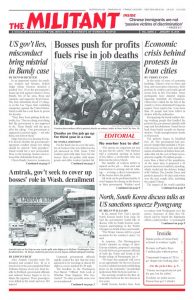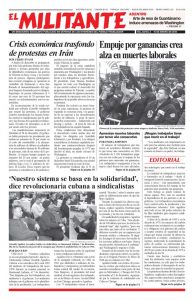Louis Billingsley, a freight rail conductor with 12 years experience, is fighting his firing after speaking out against unsafe practices and conditions at the CSX railroad in a televised interview on CBS Action News Jax in Jacksonville, Florida. Jacksonville is CSX’s corporate headquarters.
CSX, one of the two large Class 1 railroads covering the eastern half of the country, along with Norfolk Southern, has been on a drive to combine trains, eliminate workers’ jobs and make more profit for the bosses and bondholders.
Action News Jax reported last June that freight trains often keep traffic backed up in the area for hours, preventing people from getting to work or to medical or other appointments.
One woman interviewed had to miss her treatment for Stage 3 cancer, as all roads out of her neighborhood were blocked by a train.
These longer trains are part of a drive for profits in the rail industry, especially in the seven Class 1 roads in North America — which each rake in at least $453 million annually. Together they control 69 percent of the industry’s trackage, 90 percent of its workers and 94 percent of all freight revenue.
When Billingsley was on a train crew that kept a series of crossings closed, he told Action News in July that seeing people disrupted this way “was heartbreaking.” Billingsley told the reporter that at one point he separated one of the trains in the Dinsmore neighborhood that had blocked traffic for two hours.
“These trains are getting longer and doubling up,” Billingsley told Action News, adding that CSX “stocks are going up, that’s all they care about.”
“I have to walk back here and fix the train, and my radio can’t even reach the engineer it’s so long,” he said.
The day after the interview was aired, CSX sent Billingsley a voicemail saying he was fired. Then 40 minutes later the company sent another voicemail saying he was rehired.
For the next two months, CSX managers followed Billingsley, looking to pressure him into any infraction of their rulebook. They found a pretext to fire him. Billingsley’s “crimes?” They said he stepped on a rail and threw a switch with one hand, neither of which was any conceivable threat to the communities residing near the tracks.
Billingsley has refused to be intimidated. He retained a lawyer, John Magnuson, and filed a claim with the Occupational Safety and Health Administration. They are considering a “whistle-blower” suit through the federal courts.
In August 2017, just eight months after CSX inaugurated its “Precision Scheduled Railroading” — a term coined by its new CEO Hunter Harrison — a two-mile-long train, hauling dangerous chemicals, derailed in Hyndman, Pennsylvania.
Tank cars filled with liquid propane and molten sulfur ruptured and burst into flames, forcing the evacuation of over 1,000 people from the town and surrounding areas for days.
Harrison’s version of “precision” railroading is admired and imitated by profit-hungry rail bosses across North America.
Harrison died suddenly in December. The bosses at CSX and its shareholders had brought him over from Canadian Pacific Railway earlier in 2017 because of his record of “turning around” the profit rates at Illinois Central Railway and Canadian National Railway.
He led the bosses there in attacks on jobs, safety conditions, elimination of less profitable yards and train combinations that led to stockholders pocketing higher returns on their shares — 516 percent at Illinois Central, 1989-97; 353 percent at Canadian National, 1998-2009; and 319 percent at Canadian Pacific.
In addition to dangerously increasing train lengths and eliminating safer practices and rules, Harrison and CSX bosses closed major yards, including in Atlanta and Cumberland, Maryland, and they’ve laid off close to 10 percent of the railroad’s 28,000 workers. Nine cars derailed on another CSX train in Hyndman Dec. 29. Management at CSX — and their competitors across the continent — have made clear they will continue their productivity and profit drive, as they have done throughout the industry for decades.

